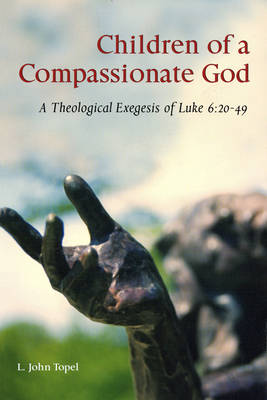
- Afhalen na 1 uur in een winkel met voorraad
- Gratis thuislevering in België vanaf € 30
- Ruim aanbod met 7 miljoen producten
- Afhalen na 1 uur in een winkel met voorraad
- Gratis thuislevering in België vanaf € 30
- Ruim aanbod met 7 miljoen producten
Omschrijving
2002 Catholic Press Association Award Winner!
Children of a Compassionate God is a detailed theological examination of Luke's "Sermon on the Plain," the counterpart in Luke's Gospel to Matthew's "Sermon on the Mount." Utilizing composition criticism, L. John Topel, S.J., explains what Luke meant Jesus' words to say to Luke's late first-century community and what such a message might mean to contemporary Christians. By inquiring into the theological intent of the evangelist, Topel helps us see how it is possible to undertake the Sermon's extraordinary commands.
In Part I Topel establishes Jesus' authority as the Son of God to teach by looking at the preface, Luke 1:1-4, which explains who Jesus is, what he is doing, why, and for whom. He first explains how the preface gains the implied reader's trust in Luke's authority necessary for successful narrative communication. He then considers the prologue (1:5-2:52), which establishes Jesus' authority to command obedience to the radical demands of the Sermon.
In Part II Topel looks at how Jesus reveals his ethical teaching, primarily to disciples but also to outsiders eager to hear him. In examining the beatitudes, he discusses how the reward offered in the first beatitude supplies not only the final, but also the efficient, cause for all of the beatitudes. Topel expounds on how Jesus transforms the Old Testament wisdom form into paradoxical proclamations of the reversed conditions of the final Reign of God which he is ushering in. Topel also considers the woes; the Love Command (6:27-36); and the Critique of Judgment (6:37-42).
Part III explores the good news of the Sermon. Topel demonstrates how two essential characteristics of the Sermon make it difficult to practice. It asks for the peak of human authenticity and for total conversion to the neighbor. The qualities and the actions which embody them are strikingly countercultural, not only for first-century Jews and Hellenistic Greeks and Romans but also to contemporary Christians. Still, the central image of the Sermon itself, the Children of God (6:35), provides the final clue: that empowerment by the Holy Spirit which made Jesus the Son of God in conception and career also makes his disciples children of God, able to address God in prayers as Abba, and to be compassionate as God is compassionate.
Chapters in Part I The Literary Context of the Sermon are "Chapter I: The Prologue," and "Chapter II: The Beginning of the Ministry." Chapters in Part II: Exegesis of the Sermon on the Plain are "Chapter III: Blessed are the Poor," "Chapter IV: Beatitudes and oes," "Chapter V: The Love Command," "Chapter VI: The Critique of Judgment," and "Chapter VII: Parenesis on True Discipleship." The final chapter in Part III: The Interpretation of the Sermon is "Chapter VIII: The Theology of the Lukan Sermon."
L. John Topel, SJ, PhD, is professor and chair of religious studies at Seattle University.
Specificaties
Betrokkenen
- Auteur(s):
- Uitgeverij:
Inhoud
- Aantal bladzijden:
- 360
- Taal:
- Engels
- Reeks:
Eigenschappen
- Productcode (EAN):
- 9780814650851
- Verschijningsdatum:
- 1/10/2001
- Uitvoering:
- Paperback
- Formaat:
- Trade paperback (VS)
- Afmetingen:
- 153 mm x 229 mm
- Gewicht:
- 576 g

Alleen bij Standaard Boekhandel
Beoordelingen
We publiceren alleen reviews die voldoen aan de voorwaarden voor reviews. Bekijk onze voorwaarden voor reviews.











